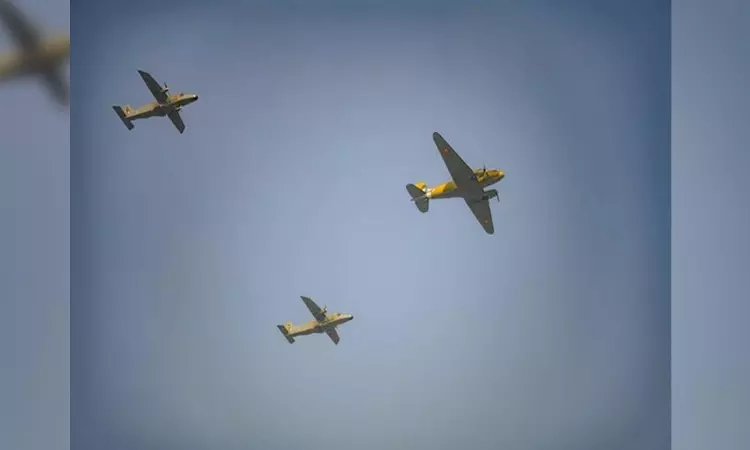Dorniers in IAF's Tangail formation to fly using ATF-biofuel mix during R-Day flypast
The 'Tangail' formation will reenact the successful airdrop in which Indian Air Force personnel were dropped in parachutes on December 11, 1971.

Tangail formation (ANI)
NEW DELHI: The 'Tangail' formation that will be flown during the Republic Day flypast will include the heritage aircraft Dakota flanked by two Dornier Do-228 aircraft which will be flying using a blended mixture of Aviation Turbine Fuel and Biofuel, the Indian Air Force (IAF) said on Tuesday.
The 'Tangail' formation will reenact the successful airdrop in which Indian Air Force personnel were dropped in parachutes on December 11, 1971, which marked the first airdrop of Indian security forces on hostile territory during the India-Pakistan war.
In addition to this, made-in-India weapon systems and platforms would also be among the main attractions in this year's Republic Day parade from the Indian Army including the LCH Prachand chopper, Pinaka multi-barrel rocket launchers and Nag anti-tank missiles.
The LCH Prachand is the first indigenous Multi-Role Combat Helicopter designed and manufactured by HAL. It has potent ground attack and aerial combat capability. The helicopter possesses modern stealth characteristics, robust armour protection and formidable night attack capability. Onboard advanced navigation system, guns tailored for close combat and potent air to air missiles make the LCH especially suited for the modern battlefield.
NAG has been developed by DRDO to engage highly fortified enemy tanks in day and night conditions. The missile has "Fire & Forget" "Top Attack" capabilities with passive homing guidance to defeat all MBTs equipped with composite and reactive armour.
The NAG missile carrier NAMICA is a BMP II based system with amphibious capability. The latest armoured vehicles and specialist vehicles produced by the Indian industry indigenously are also going to be showcased at the parade where French President Emmanuel Macron will be the chief guest, Army officials said.
The Quick Fighting Reaction Vehicle, Light Specialist Vehicle and the All-Terrain Vehicle would be marching on the Kartavya Path this year. The weapon systems would also include the T-90 tank, BMP-2 infantry combat vehicle, c, Drone jammers, Advanced Sarvatra bridge, Medium Range Surface to Air Missile launcher and multi-function radar, they said.
Swathi Weapon Locating Radar, is an indigenously designed WLR which is capable of locating guns, mortars and rockets firing own troops, thereby facilitating their destruction through Counter Bombardment by own firepower resources. This will enable troops to carry out their operational tasks without any interference from the enemy and also provide them safety against enemy fire.
Along with the Light Combat Helicopter, the Indian Army would also be showcasing the weaponised version of the ALH Dhruv choppers which is also known as the Rudra. The weapon systems to be showcased at the parade also include the Pinaka and the Swathi radar which have been successfully exported to foreign customers by Indian entities. Both have been developed by the DRDO.
The enhanced range version of Pinaka Rocket System can destroy targets at distances up to 45 kms. The rocket system has been developed jointly by Pune based Armament Research and Development Establishment (ARDE) and High Energy Materials Research Laboratory (HEMRL).
The Army is also going to showcase the growing role of women in defence forces as 60 of its women soldiers are going to be part of the tri-services all-women marching contingent which would include women from the Air Force and Navy too.



